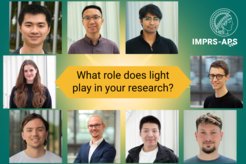Happy International Day of Light!
What role does light play in the research of our doctoral candidates?

Today, we proudly join the worldwide celebration of the International Day of Light, commemorating the anniversary of Theodor Maiman’s groundbreaking invention of the first functioning laser exactly 65 years ago and highlighting the importance of light in our lives.
To mark this special occasion, we asked some of our doctoral candidates: 𝗪𝗵𝗮𝘁 𝗿𝗼𝗹𝗲 𝗱𝗼𝗲𝘀 𝗹𝗶𝗴𝗵𝘁 𝗽𝗹𝗮𝘆 𝗶𝗻 𝘆𝗼𝘂𝗿 𝗿𝗲𝘀𝗲𝗮𝗿𝗰𝗵? Their answers highlight the incredible impact of light across the diverse research groups in our graduate school, dedicated to advancing photon science.
What role does light play in your research?
“In my research, light is used as a camera to capture the fast movements of materials, or as a probe to detect the health status of the human body. We use light to generate light, and light to detect light. Ultimately, our goal is to utilize the most stable light possible to build the world's most precise spectrometer.” - Wei Liang
“For me, as a theoretical physicist, light is an equation that latches on to another equation (medium). The equation can be represented in infinitely many ways (gauges). They are all supposed to be equivalent but they aren’t. Basically it is a paradoxical object whose entire existence centers around keeping physicists awake at night.” - Manoram Agarwal
“In our group, we study processes that are driven by light, for example photosynthesis or photocatalysis. For us, light is not only our energy source but also a powerful analytical tool.” - Alina Bach
“Light captures the birth of motion, the spark of ionization, the transport of charge and makes the invisible visible. It plays a central role as both the driver and the probe of ultrafast electron dynamics. It can enable me to resolve processes that were thought to happen instantaneously and furthermore allows me to discover some of the fundamental optoelectronic properties of materials by observing the charge carrier dynamics under the injection of light pulses themselves. This can have future benefits such as faster electronics and more precise medical diagnostics.” - Arber Selimi
“In my research, light plays a dual role. On one hand, it serves as the driving force that initiates ultrafast electron dynamics in the target material. On the other hand, light also acts as a precise probe that captures those dynamics with sub-cycle resolution. Essentially, light is both the trigger and the diagnostic tool, allowing us to generate, control, and observe ultrafast processes in matter.” - Weiwei Li
“In my PhD project, we are capturing the unique "fingerprints" of molecules under the excitation of ultrashort laser pulse. By analyzing different patterns of light field response induced by molecular vibrations, we can reveal the information of molecular composition and structure, which has various applications of chemical analysis, identification of substances and human health monitoring.” - Zheng Wei
“Light is both a tool and an object of my research. We use laser light to illuminate electrons in atoms, molecules, or crystals, but to do this we need to generate ever more ‘interesting’ flashes - shorter in duration and and with many wavelengths. In my experiment, we record the shape of these flashes by illuminating them with another unique pulse. Ultimately, we investigate a crystal that acts like a mirror - until the most intense part of the flash turns it dark - all happening about a million times faster than any electronic switch.” - Marco Dassie
“In my research, light - specifically high repetition rate laser pulses - is the key to understanding the molecular fingerprint of a sample. Without the right laser source, we couldn’t extract the information we are interested in. Light is a cornerstone of our experiments and a profound understanding of it is crucial for cutting-edge research and exploring possible applications.” - Benedict Röcken
"My research does not center as much around the actual physical properties and manipulations of light but more around light as a carrier of information - about itself or any matter it interacted with. With this view in mind we try to use established spectroscopic techniques where we introduce a few smart tweaks to extract the most information in the most efficient way possible." - Jakob Schröder
